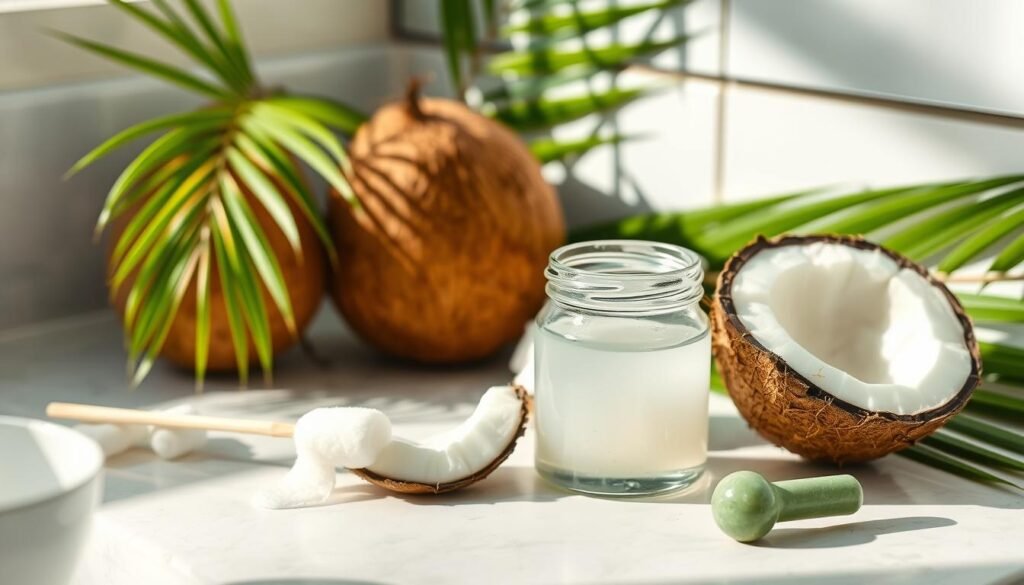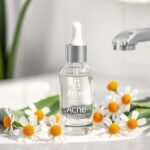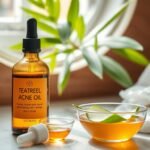Coconut oil ranks four on the zero-to-five comedogenicity scale. This scale categorizes ingredients from non-pore-blocking to highly pore-blocking1. Yet, many people use coconut oil for acne treatment. Let’s explore its potential benefits and uses.
Lauric acid in coconut oil has antimicrobial and anti-inflammatory properties1. These may help reduce acne-causing bacteria2. For best results, massage coconut oil between your hands before applying1.
Virgin coconut oil hydrates without clogging pores, ideal for dry skin2. Its anti-inflammatory benefits might reduce redness and irritation from acne breakouts2. Coconut oil allergies are rare, but possible1.
However, coconut oil can clog pores and cause pimples. This is especially true for acne-prone skin12. People with oily skin may find it worsens their condition. Those with sensitive skin might experience irritation2.
Coconut oil may boost collagen production and improve wound healing. This could help with acne scars1. If you’re curious about natural remedies, check out this article on treating green nails at home.
Key Takeaways
- Coconut oil contains lauric acid, which has antimicrobial and anti-inflammatory properties that may help reduce acne.
- Virgin coconut oil can provide hydration without clogging pores, making it suitable for dry skin types.
- Coconut oil is comedogenic and may worsen acne in some individuals, particularly those with oily or acne-prone skin.
- Massaging coconut oil between your hands before application can help achieve a liquid consistency for better absorption.
- Patch testing is crucial before incorporating coconut oil into your skincare routine to check for allergies or irritation.
Stay tuned for reviews on beauty supplies. We cover skincare routines, moisturizers, anti-aging creams, and makeup. Find the best products for your hair, nails, and more.
The Controversy Surrounding Coconut Oil and Acne
Coconut oil’s role in acne treatment sparks debate in the skincare world. Some praise its anti-inflammatory and antimicrobial qualities. Others warn about its pore-clogging potential.
As an acne sufferer, I know the struggle to find effective treatments. The right solution depends on your unique skin type.
Potential Benefits of Coconut Oil for Acne-Prone Skin
Coconut oil contains lauric acid, which fights skin bacteria and reduces inflammation3. This may help combat acne-causing bacteria and soothe irritated skin3.
A study found that lauric acid beats benzoyl peroxide in stopping acne bacteria4. Virgin coconut oil also boosts skin barrier function and hydration3.
Risks and Drawbacks of Using Coconut Oil on Acne
Coconut oil can clog pores, potentially causing breakouts in acne-prone skin3. It may irritate oily or sensitive skin when applied directly3.
Acne affects about 85 percent of young adults worldwide5. For congested skin, oils like calendula or hemp seed might work better3.
I’ve tried many natural acne remedies. It’s crucial to know your skin type and watch how it reacts to new products.
More research is needed on coconut oil’s effectiveness for acne5. Consult a dermatologist to find the best approach for your skin.
Check back often for the best reviews on beauty supplies, including the best hair color kit, best moisturizer for dry skin, best makeup brushes, best anti-aging cream, best foundation for oily skin, best cruelty-free makeup, best hair growth serum, best skincare routine, best nail polish remover, best vegan beauty products, best acrylic nails, and the best beauty blender.
Understanding Your Skin Type Before Using Coconut Oil

Know your skin type before adding coconut oil to your skincare routine. Its effectiveness varies for dry, oily, or combination skin. Coconut oil’s suitability depends on your unique skin needs.
Coconut Oil for Dry Skin
Coconut oil can transform dry skin care. Its fatty acids, especially lauric acid, have antiviral and antifungal properties. These qualities help maintain healthy skin.
A 2020 study showed virgin coconut oil boosted skin hydration by 24.8%. It also improved skin elasticity by 2.6% over 28 days. This outperformed body lotion without coconut oil6.
The oil’s medium-chain fatty acids enhance skin elasticity and suppleness. This makes it great for combating dry, flaky skin6.
Coconut Oil and Oily Skin: A Cautionary Tale
Oily or acne-prone skin types should be careful with coconut oil. It’s highly comedogenic, scoring 4 out of 5 on the comedogenic scale7. This means it’s likely to clog pores.
Clogged pores can lead to acne breakouts and blackheads7. If you have oily skin, avoid using coconut oil on your face. It may increase oil production and cause acne8.
I learned the hard way that coconut oil and my oily skin don’t mix well. After using it as a moisturizer, I experienced the worst breakout of my life. Now, I stick to lighter, non-comedogenic oils that keep my skin balanced and clear.
Navigating Coconut Oil Use for Combination Skin
Combination skin requires strategy when using coconut oil. Identify your face’s dry and oily areas first. Apply small amounts to dry patches, avoiding the oily T-zone and acne-prone areas7.
Use coconut oil sparingly on your face. The skin here is thinner and more sensitive than elsewhere7. Moderation is key for best results.
| Skin Type | Coconut Oil Suitability | Application Tips |
|---|---|---|
| Dry | Highly suitable | Apply as a moisturizer to improve hydration and elasticity |
| Oily | Not recommended | Avoid using on the face to prevent clogged pores and breakouts |
| Combination | Suitable with caution | Apply sparingly to dry areas, avoiding oily and acne-prone regions |
Always patch test coconut oil first. Monitor your skin’s response closely. For some, it fights acne effectively. Others may experience adverse reactions. Listen to your skin and adjust accordingly.
Stay tuned for tips on choosing the right coconut oil. We’ll also cover how to use it in DIY acne treatments. Your skin’s health is our top priority.
Visit us for reviews on beauty supplies. We cover acrylic nails, nail polish removers, hair color kits, and growth serums. Find the best moisturizers, vegan products, and cruelty-free makeup. Discover top anti-aging creams, foundations, makeup brushes, and beauty blenders.
Choosing the Right Type of Coconut Oil for Acne Treatment
Selecting the right coconut oil is crucial for treating acne naturally. Not all coconut oils are equal. Some may even worsen acne due to processing methods or added ingredients.
The Importance of Organic, Virgin Coconut Oil
For acne-prone skin, organic, virgin coconut oil is best. It’s extracted from fresh coconuts without high heat or chemicals. This preserves its natural composition of medium-chain fatty acids.
Look for labels stating “organic” and “virgin” or “extra-virgin.” These terms indicate minimal processing. Dr. Wu recommends pure, unrefined, cold-pressed coconut oil for maximum benefits9.
Avoiding Processed and Refined Coconut Oils
Avoid processed or refined coconut oils for acne treatment. Refined oil may lose antioxidant benefits during production10. Processed oils might contain added sugars that could clog pores.
Coconut oil is highly comedogenic, likely to clog pores on the face9. The risk is higher in areas with thinner skin, like under the eyes. It can increase milia, tiny white or yellow bumps9.
Coconut oil can contribute to blackheads and whiteheads, indicators of inflammatory acne9. Always read labels carefully and choose organic, virgin varieties. This helps harness its acne-fighting properties while minimizing risks.
Check back often for the best reviews on beauty supplies. We cover acrylic nails, nail polish remover, hair color kits, and hair growth serums. Find info on skincare routines, moisturizers, and vegan beauty products. Explore cruelty-free makeup, anti-aging creams, foundations, makeup brushes, and beauty blenders.
How to Use Coconut Oil for Acne Treatment

Coconut oil can be a natural acne remedy for some people. It’s important to know your skin type before using it. Always do a patch test first to check for any reactions.
Patch Testing: A Crucial First Step
Start with a patch test before using coconut oil on your face. Apply a small amount to your inner forearm. Wait 24 hours to see if there’s any irritation or redness.
If your skin stays clear, you can try using it on your face. This step helps prevent potential skin problems later on.
Applying Coconut Oil as a Spot Treatment
Coconut oil works well as a spot treatment for very dry or oily skin. Use a small amount of liquid coconut oil on affected areas. Apply it gently with a clean finger or cotton swab.
Don’t use too much, especially if you have oily skin. Coconut oil can clog pores if overused1112.
Incorporating Coconut Oil into Your Skincare Routine
If your skin likes coconut oil, add it to your daily routine. Use it to remove makeup, especially waterproof types. Massage it into your skin, then use a gentle cleanser.
You can mix coconut oil with tea tree oil or honey for a face mask. Apply the mix, leave it on for 10-15 minutes, then rinse off. Coconut oil has antibacterial and anti-inflammatory properties.
| Skin Type | Coconut Oil Usage | Tips |
|---|---|---|
| Very Dry Skin | Can be left overnight | Use a small amount to avoid over-moisturizing |
| Oily Skin | Use sparingly as a spot treatment | Remove excess oil to prevent clogged pores |
| Combination Skin | Patch test and use accordingly | Monitor skin’s response and adjust usage |
Coconut oil may help with active acne but not acne scars. Start using it slowly and watch how your skin reacts. Stop if you get breakouts or irritation.
For more beauty tips, check our reviews on vegan products, moisturizers, and hair growth serums. We also cover makeup brushes, acrylic nails, and anti-aging creams. Find the best foundation, nail polish remover, and hair color kits too.
Coconut Oil as a Natural Makeup Remover
Coconut oil is a gentle and effective makeup remover. It works well for all skin types, making it versatile for skincare13. Coconut oil can dissolve makeup, even waterproof mascara.
The Double Cleansing Method with Coconut Oil
Try the double cleansing method with coconut oil. Massage liquefied coconut oil onto your face, focusing on areas with heavy makeup. Skincare experts consider coconut oil a good facial cleanser14.
As you massage, the oil breaks down makeup. Your skin will feel clean and refreshed. Coconut oil eliminates the need for other makeup removal products13.
Following Up with a Gentle Cleanser
After using coconut oil, follow up with a gentle cleanser. This removes any remaining oil and debris. Choose a mild formula that won’t strip your skin’s natural oils.
This routine keeps your skin healthy and glowing. It helps maintain balance and prevents dryness and irritation.
Check back for reviews on beauty supplies. We cover acrylic nails, nail polish remover, hair color kits, and more. Find info on hair growth serums, skincare routines, and moisturizers for dry skin.
We also review vegan and cruelty-free makeup products. Learn about anti-aging creams, foundations for oily skin, makeup brushes, and beauty blenders.
FAQ
Can coconut oil help treat acne?
Is coconut oil suitable for all skin types when treating acne?
What type of coconut oil should I use for acne treatment?
How do I incorporate coconut oil into my acne treatment routine?
Can I use coconut oil as a makeup remover if I have acne-prone skin?
Are there any risks associated with using coconut oil for acne treatment?
Source Links
- Can You Use Coconut Oil on Acneic Skin? We Asked Dermatologists – https://www.byrdie.com/coconut-oil-for-acne
- Does Coconut Oil Help Acne? (Hint: It Depends) – https://www.exposedskincare.com/blogs/blog/does-coconut-oil-help-acne
- Coconut Oil for Skin Care: Yay or Nay? – https://wildnaturals.com/blogs/blog/coconut-oil-for-skin-care-yay-or-nay?srsltid=AfmBOorgGS9GsM970jTS01vhiIY6vPgf_0S2oWj93oU56uXMCThYr0sD
- Is Coconut Oil Really All That Great for Your Skin? – https://www.shape.com/lifestyle/beauty-style/coconut-oil-for-skin
- Fight Acne with These Simple At-Home Remedies – https://www.healthline.com/nutrition/13-acne-remedies
- Coconut Oil Moisturizer Do’s and Don’ts – https://www.healthline.com/health/coconut-oil-moisturizer
- What You Need to Know Before Using Coconut Oil for Skin – https://www.herbaldynamicsbeauty.com/blogs/herbal-dynamics-beauty/what-you-need-to-know-before-using-coconut-oil-for-skin?srsltid=AfmBOooT84Q_K3C68XZdiDYnMuO_37IPc0nzUYNqGdxYndwmVaqWF3LA
- Use Coconut Oil on Your Skin? Know the Pros and Cons – https://www.eatingwell.com/article/7923262/coconut-oil-for-skin/
- Is Coconut Oil Good For Your Skin? – https://health.clevelandclinic.org/coconut-oil-for-skin
- Coconut Oil for Skin: Benefits, Application, When You Shouldn’t Use It – https://www.verywellhealth.com/coconut-oil-for-skin-8420079
- How You Can Use Coconut Oil For Acne – https://www.bebeautiful.in/all-things-skin/skin-concerns/how-you-can-use-coconut-oil-for-acne
- Why Coconut Oil for Acne Actually Causes Breakouts – https://www.exposedskincare.com/blogs/blog/coconut-oil-for-acne
- How to Clean Your Face with Coconut Oil – https://coconutsandkettlebells.com/how-to-clean-your-face-with-coconut-oil/
- The Controversial £10 Product That My Friend With Great Skin Uses for Everything – https://www.whowhatwear.com/coconut-oil-for-face








Interesting read but honestly, has anyone considered the environmental impact of coconut oil production on acne treatment? Just food for thought.
Interesting read, but isnt slapping oil on acne akin to putting out a fire with gasoline? Yay or Nay? #AcneVsCoconutOil
Really, coconut oil for acne? Id rather use pizza grease. Has anyone tried that? Its all fats anyway, right? 😂 #PizzaFace
Interesting read, but isnt applying oil to acne-prone skin counterproductive? Wont it trigger more breakouts instead of treating them? Just a thought.
Oil isnt the enemy. Its about type and balance. Ever heard of oil cleansing?
Interesting read, but isnt it contradictory to apply oil on acne? Isnt it like adding fuel to the fire? Just my two cents.
Anyone else think coconut oil is just overhyped? I mean, it broke me out even worse! Maybe it depends on skin type?
Coconut oil for acne, really? Ever consider it might clog pores more? Isnt it comedogenic? Lets discuss about this more!
Honestly, I find it hard to believe that coconut oil can help acne. Isnt it notorious for clogging pores?
Interesting read, but isnt it contradictory to use oil to fight oily skin? Just seems counterproductive to me. Thoughts?
Ironic, isnt it? Were slapping on coconut oil for acne, yet its a known pore-clogging culprit. Thoughts, anyone?
Interesting read but isnt it ironic that coconut oil, a known comedogenic, is being recommended for acne-prone skin? Thoughts?
Well, sometimes fighting fire with fire works. Coconut oil isnt the enemy for everyone.
Interesting read, but isnt it contradictory to put oil on acne-prone skin? Wouldnt that worsen the situation? Just food for thought!
Im skeptical, guys. Is coconut oil for acne really a good idea, or just another Instagram fad? #notconvinced #showmethescience
I get the coconut oil benefits, but isnt it comedogenic? Wouldnt that make acne worse? Just seems counter-productive to me.
Coconut oil for acne, really? Its a comedogenic product, guys! Ever thought it might clog pores more? Lets dig deeper, shall we?
Does anyone else feel like coconut oil is just overhyped? I mean, it made my acne worse! Anyone else had a similar experience?
I get coconut oils benefits, but wont it clog pores more? Seems counterproductive to me. Anyone else believe its more of a fad than a cure?
Interesting read, but isnt coconut oil comedogenic? Wont it actually clog pores and worsen acne? Open to thoughts!